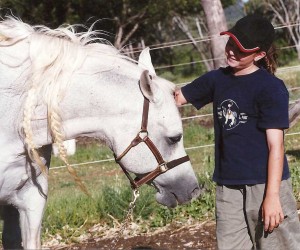Empathy begins with awareness
We all know empathy begins with awareness of another person’s feelings. It would be easier to be aware of other people’s emotions if they would simply tell us how they felt.
Simeon Stav (stallion) with his young friend Kimberley. Mutual empathy!
But most people are unable to do this so we must resort to asking questions or reading between the lines, guessing, and trying to interpret non-verbal cues. Emotionally expressive people are easiest to read because their eyes and faces are constantly letting us know how they are feeling. But what about our horses in my first novel ‘Tails Carried High”’ one of my characters when talking about one of his mares said:- ‘…Like her ancestors, she has a mystical power over some of us. Silly coming from an old codger like me, but horses have supported our existence for centuries and have far more empathy with us than we have with them.’
From the fabulous web site of Franklin Levinson ‘Way of the Horse’ I have included a thought provoking excerpt from one of his essays. In a world that’s increasingly becoming less and less bothered with empathy this insightful excerpt offers a reason why it’s important to work on our own emotional awareness and sensitivity—only then can we truly understand our horses.
Franklin Levinson’s “Way of the Horse” www.wayofthehorse.org
an excerpt from Frank Levinson’s:
The Empathetic Horseman
… “Then I was reminded about an article I read by a very high level dressage rider that was in a leading equine magazine in the UK. She was saying how it was just fine to ‘sting’ a horse with the dressage whip to motivate it. Her justification was that whatever discomfort the horse felt from the sting of the whip, it was nothing compared to the pain horses can and do occasionally inflict upon each other. This infuriated me when I read it. We are not horses. We are supposed to actually be able to develop ways of communication and asking for what we want that do not involved brute force, pain or coercion. We should be able to do this with other humans and with horses as well. I am against torture as a way to extract information and compliance. So, for me the problem the horse had was the humans training and riding it. This award winning dressage rider was a huge part of the problems the horse was having in developing a good work ethic.
Horses need to be rewarded for their effort which helps them to know they are on the right track with their human. If we always only go to trying to correct behavior, the horse never gets the signals that it has done the right behavior. This is also called negative reinforcement. In other words, the removal of the pain of the whip is used as the reward for what the human wants the horse to do. This may work in the short run. But over time, negative reinforcement involving pain will become to feel like punishment and dulls the horse’s responses. We can all get used to pain actually and if we receive enough of it we can become callus to it. This is not good.
Feeling what others are feeling is called empathy. Horses are naturally and always empathetic. The members of the herd feel what is going on for the other members of the herd. This is why the horses often move as one unit when in the herd. Empathetic responses help the animals to become bonded, develop trust, respect and create loyalties. A relationship that has involved empathy will be deeper and more compelling than one that has not. If we have empathetic relationships with our horses they truly become our trusted companions and we become that to them as well. If this sort of relationship is established, generally the horse will really try as hard as it can to comply with the wishes of the human. This is partly because the human has stepped up as the empathetic great leader for the horse. That person has become the great leader of the herd.
Of course, our requests for work have to be appropriate for the condition, training and understanding of the horse. If any of these aspects of the communication and relationship are absent, it should not be expected that the horse will try to comply. Punishment and use of force to motivate the animal will be futile and only cause abuse to happen on the horse. Horses should never be accused of doing anything personally to a human. It’s only a horse, an innocent animal and does not think to intentionally cause a human to have problems, spoil a human’s day, make a human look bad or ever have any such inclination to personally do something to a human. All behavior we see in our horses that we call bad or stubborn is born out of fear within the horse. Horses will never act against their good leader. After all, it is the leader of the herd that, more than any other herd member, helps assure the survival of the herd. She goes, they follow without question. She moves and they get out of her way. Some herd members sleep and others stand guard. Then they switch. All their interaction goes on with a harmony brought about through empathy.”
You can read this enthralling essay in it’s entirety and many others at Franklin Levisons website www.wayofthehorse.org

Leave a Reply